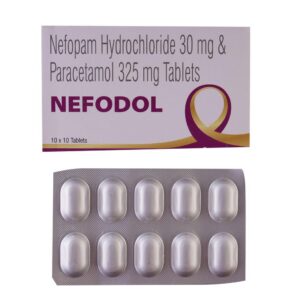PARACETAMOL (ACETAMENOPHEN) + NEFOPAM
Paracetamol (acetamenophen): Paracetamol, also known as acetaminophen, is a commonly used over-the-counter medication and analgesic (pain reliever). It is used primarily to relieve mild to moderate pain and reduce fever. Paracetamol is available in various forms, including tablets, capsules, liquid suspension, and rectal suppositories.
The exact mechanism of action of paracetamol is not fully understood. It is believed to work by inhibiting the synthesis of prostaglandins, which are substances involved in the transmission of pain signals and the regulation of body temperature. Paracetamol also has a weak anti-inflammatory effect.
The recommended dose of paracetamol for adults is usually 500-1000 mg every 4-6 hours, with a maximum daily dose of 4000 mg. For children, the dose is based on their weight and age, and it is important to follow the instructions provided or consult a healthcare professional.
Paracetamol is generally considered safe when used as directed. However, like any medication, it can have side effects. Common side effects may include nausea, stomach discomfort, and skin rash. In rare cases, paracetamol can cause serious liver damage, especially when taken in excessive doses or combined with alcohol. Therefore, it is important to follow the recommended dose and avoid consuming alcohol while taking paracetamol.
It is essential to read the label and package insert, and to consult a healthcare professional if you have any questions or concerns about the use of paracetamol.
Nefopam: Nefopam, sold under the brand name Acupan, is a non-opioid analgesic medication used for the relief of moderate to severe pain. It is primarily prescribed for acute pain that occurs after surgery or trauma, as well as chronic pain conditions such as fibromyalgia.
The exact mechanism of action of Nefopam is not fully understood, but it is believed to work through multiple mechanisms. It functions as a selective norepinephrine and serotonin reuptake inhibitor, which helps to increase the levels of these neurotransmitters in the central nervous system. This enhanced neurotransmitter activity is thought to contribute to its analgesic effects.
Nefopam comes in oral tablet form and is typically taken three times a day. The dosage will vary depending on the individual’s age, weight, and the severity of the pain being treated. It is important to follow the prescribed dosage instructions provided by the healthcare professional.
As with any medication, Nefopam can cause side effects. Common side effects may include dizziness, headache, nausea, dry mouth, sweating, and sleep disturbances. These side effects are usually mild and improve with continued use. However, if any severe or persistent side effects occur, it is crucial to seek medical attention. Additionally, it is essential to inform the healthcare provider of any pre-existing medical conditions or other medications being taken to avoid potential drug interactions.

